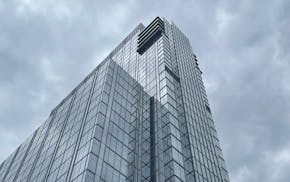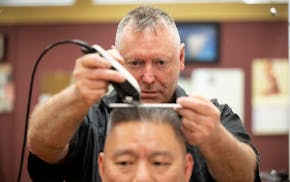The grill finally went cold this month, 26 years after two Cambodian war refugees opened their Best Steak & Gyros at Chicago and Franklin avenues.
They opened it in 1991 at the urging of a nonprofit developer who eventually turned a booze-and-crime-soaked vacant corner of the Phillips neighborhood into a modest strip mall that serves hundreds daily with shops and a day care.
Sophal Nhep, 66, and Tevy Nhep, 58, following a three-month lease extension that gave them time to plan their next act, walked away from a six-day-a-week restaurant that unpretentiously supported their family of five.
In the early years, the Nheps stepped between fighting drunks, calmed armed gang bangers, fed the needy and hosted appreciative neighbors, mayors, police commanders and a U.S. senator or two.
They were appreciated for their entrepreneurship, long hours and goodwill.
The mall owners who took over in 2014 wanted to increase Best Steak's monthly rent from $2,000 to $6,000, before agreeing to a three-month extension in June at $3,000 per month.
The plan is to renovate Best Steak into an East African eatery.
As the Nheps served free lunch to about 500 people who showed up on the last day, Sept. 15, they conceded that the business, which never generated more than $50,000 a year in gross profit, had been declining in recent years. It was time to move on.
"But I can go another 20 years," quipped a youthful Sophal Nhep, who still has a home mortgage and car loan to pay before he can retire.
The Nheps had a Plan B simmering on the back burner: "Phal's" food truck. They acquired and converted a used truck into a like-new operation for about $20,000.
They are catering and working downtown lunches five days a week, putting in about half their previous typical 12-hour days.
"This is much less work," Tevy Nhep said. "We buy the food, cook it and bring the customers the steak sandwiches and Cambodian kebabs. "We also will miss the old customers."
Two of the three Nhep children, now in their 20s and who once washed dishes and cleaned tables, took the day off from their jobs as IT jockeys, business analysts and web designers to help cook and serve the last lunch with a few other volunteers. Sophal and Tevy just circulated.
Another restaurateur donated sandwiches and salads to go with the chicken and rice.
The food ran out about 2 p.m.
"We served more than 500 people," said Nick Nhep, 29, a business analyst at UnitedHealth Group, as the crowd dwindled.
Sophal Nhep indicated in June that the world wouldn't end if he couldn't get a new lease with the owners of what is now called Baraka Plaza.
The Nheps and Best Steak were part of the turnaround of what was once one of the city's most troubled corners.
In the late 1980s, that intersection of Chicago and E. Franklin avenues was swamped with booze, drugs and crime.
The neighbors banded together to fight relicensing over several years of several bars and liquor stores that contributed to the trouble by serving chronic alcoholics and troublemakers.
Project for Pride in Living (PPL), the nonprofit housing-and-training outfit that also developed several small commercial projects over the years, redeveloped the corner, backed by patient investors and lenders. They financed the deal after nearby liquor joints closed.
The Nheps and other businesses opened in the early 1990s. More housing was built, including wet-dry housing for folks with chemical dependency issues.
And more businesses, art galleries, coffee shops, a grocery and eateries followed over the next 20 years.
PPL sold what was then Chicago Crossings for less than it cost in 2004 to mall business owners, including the Nheps.
The business owners sold it for $2.4 million in 2014 to the Somali buyers. The Nheps made about $100,000 on their investment.
After 30 years of hard work, including day labor and at factories, they had a modest education fund to help their kids.
This is still a frayed-edged neighborhood with some unsavory types. But there's more decent housing and businesses. East African, Latino, Southeast Asian and other immigrants have helped rebuild a more prosperous, peaceful community since 1991.
Outside the restaurant on Sept. 15, retired PPL CEO Joe Selvaggio, a 50-year inner-city champion, and PPL security chief Sam Riley, who opened the mall in 1991, hugged the Nheps and others who came to celebrate.
"My wife and I came in and risked our life to help clean up the neighborhood," Sophal Nhep once said. "It was all new to us back in 1992.
"The liquor stores, the drunks, the gangs, the violence. The police calls. We treat everyone with respect, but it was tough."
Thanks to the Nheps and other owners who stayed or arrived to help make good business and a better city.
"The corner got better little by little," Sophal Nhep concluded.
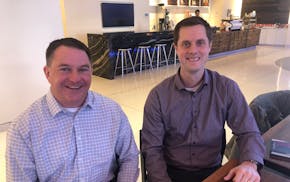
St. Anthony: 'Patient' investing paying off for St. Paul's Hill Capital
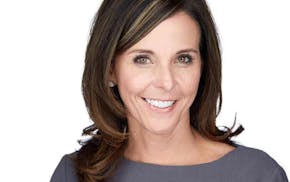
Jennifer Smith, leader of Burnsville's Innovative Office Solutions, has died
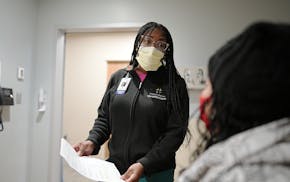
St. Anthony: Medical professions in Minnesota need more people of color in their ranks
